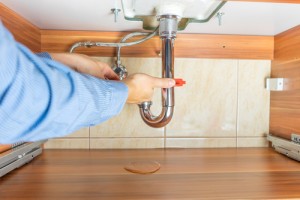You arrive home one day to discover that water has permeated almost everything you own, seeping into the walls, draining underneath your carpet, and destroying some of your treasured belongings. It’s a homeowner’s nightmare, and without quick action, plumbing leaks can lead to extensive damage, including:
- Rusted pipes – which need to be fully replaced by professionals
- Damage to the walls and foundation caused by water settling into your home – weakening the structure of the property
- The growth of mildew and mold around the property – which can lead to health and respiratory problems
No matter what causes a plumbing leak – whether it’s a heavy flood, a broken water heater, or a burst pipe – there are several things you need to do immediately to limit your losses and salvage at least some of your belongings.
Step 1: Stop the Water and Turn Off Utilities
The moment you notice a leak or flood in your home, immediately turn off the main water supply valve in the house. Make sure all members of your family know where this valve is, so any person would be able to shut it off in the event of an emergency. Be sure to turn off your utilities, as well, especially if the leak is substantial enough to cause interaction with gas or electricity.
Step 2: Prevent Electrocution and Stay Safe
A wet house is a safety hazard – and standing in water when handling any electrical device can lead to severe electrocution. Avoid entering the flooded room unless absolutely necessary. If you must enter a flooded room after a plumbing leak, wear rubber boots and stay as far away from electrical devices and wires as possible. You can use a wet-dry vacuum to suck up the water, only if you can safely plug it into a dry outlet. Otherwise, do not attempt to vacuum standing water without the help of a professional.
Step 3: Get Rid of Water (Fast)
Quick thinking after a plumbing leak will save more of your belongings, and limit the cost of repairs. If the house is only partially flooded, a wet-dry vacuum may remove some standing water – but in many cases, you’ll need the assistance of a plumber who can safely pump the water out.
Remember, though you might be able to dry out and save some items from the flooded spaces, you’ll need to discard others. Organic materials like wood, leather, fabric, and paper will attract mold if they remain wet for longer than a day or two.
If possible, try using a dehumidifier or opening windows to assist the drying out process.
Step 4: Disinfect
Once you’ve finished drying out the area, dispose of any dangerous materials that may promote the growth of mildew and mold. Then, use disinfectant to remove bacteria that might have come up through a broken plumbing system.
Step 5: Trace the Cause of the Leak
Now that your home is safe, your belongings are drying (the salvageable ones), and you’ve cleaned and disinfected, you can do a little detective work to find out how this issue arose. Reach out to a contractor or plumber, who will be experienced in what to look for and how to resolve the problem.
Plumbing can leak for a variety of reasons, and from numerous places. You don’t need to know exactly what caused the problem when you call the contractor or plumbing professional; but it can be helpful to give them a general idea of the issue, so that they know where to start.
If this flood is still happening (during a heavy rainstorm, for instance), try to track down the spot where the water is leaking into your home. After your home has dried out, search for cracks in pipes, and other common plumbing problems. If water is leaking in through basement windows, or the foundation of your home, you should contact a basement waterproofing professional.
Step 6: Defend Against Further Leaks
Once your plumbing is all fixed, think about how you can prevent such problems from happening again. Consider installing sump pump systems and interior drains, which decrease the possibility of flooding in your basement and crawl spaces.
Sump pump systems help to capture water and remove it before it reaches the basement floor, so excess moisture drains outside of the house. This will not necessarily protect you from a broken pipe, but it will drastically limit the damage caused by a leak. A plumbing professional will be able to give you an expert opinion on preventative measures for your home.
Conclusion
When reacting to a plumbing leak, the most important thing to keep in mind is that it’s crucial to act fast, but still use caution. Although your mind may be set on saving valuable objects around your home, don’t do anything that might put you, or your family in danger. If you’re unsure, it’s always wise to contact a professional who has handled these issues before, instead of taking the risk yourself.


 FREE Live Music and Family Fun at Allied Gardens First Fridays The next Allied Gardens First Fridays Summer Concert in the Park is just around the corner. Grab your lawn chairs, bring a picnic, and get ready to meet your
FREE Live Music and Family Fun at Allied Gardens First Fridays The next Allied Gardens First Fridays Summer Concert in the Park is just around the corner. Grab your lawn chairs, bring a picnic, and get ready to meet your  Ideal Plumbing Heating Air Electrical Named Winner of 2023 Better Business Bureau Torch Awards for Ethics in San Diego (San Diego, CA – September 15, 2023) Better Business Bureau Serving the Pacific Southwest (BBB) has named Ideal Plumbing Heating
Ideal Plumbing Heating Air Electrical Named Winner of 2023 Better Business Bureau Torch Awards for Ethics in San Diego (San Diego, CA – September 15, 2023) Better Business Bureau Serving the Pacific Southwest (BBB) has named Ideal Plumbing Heating